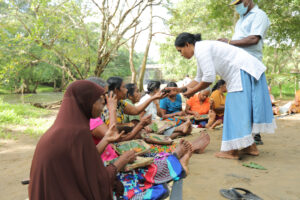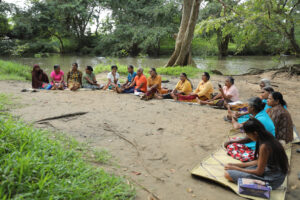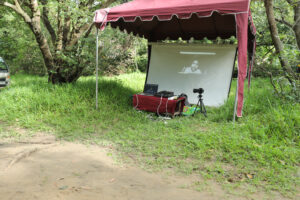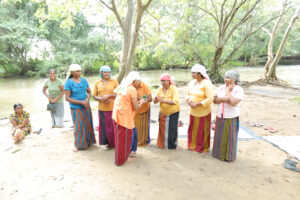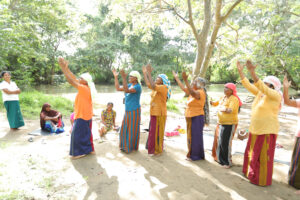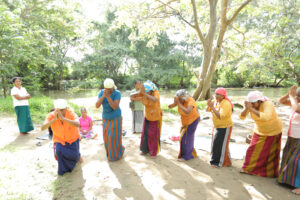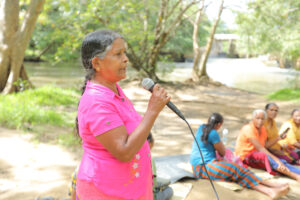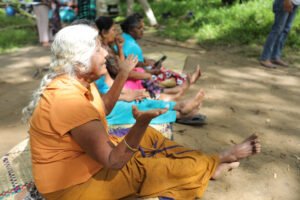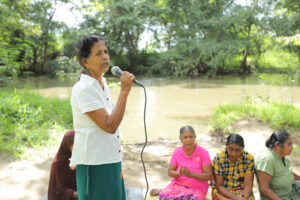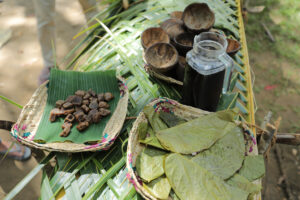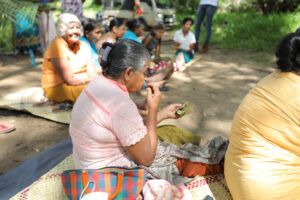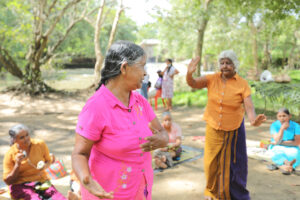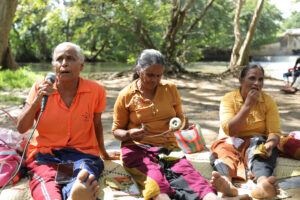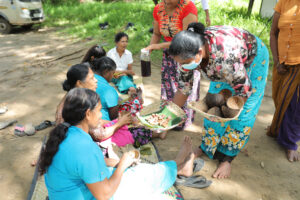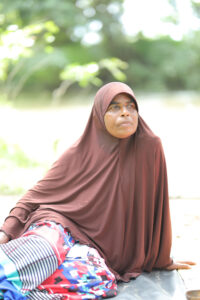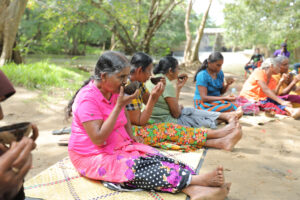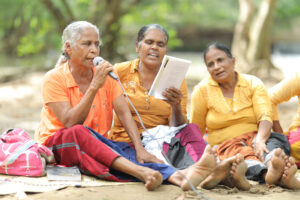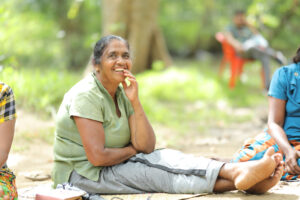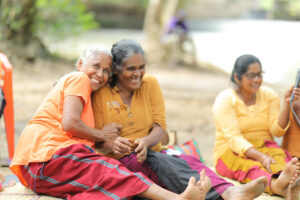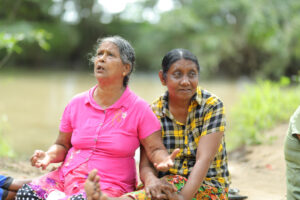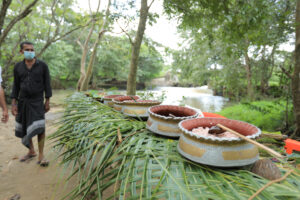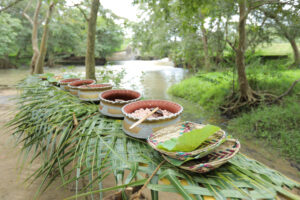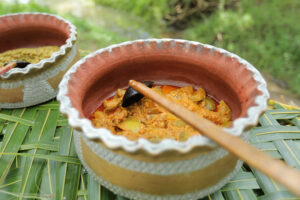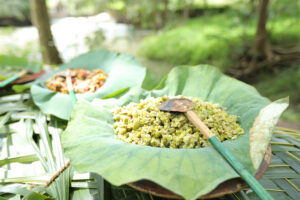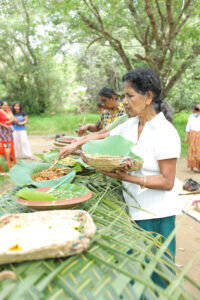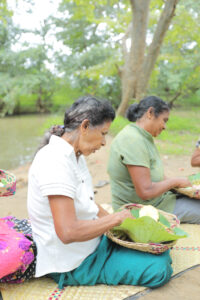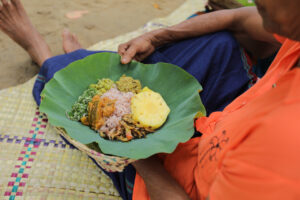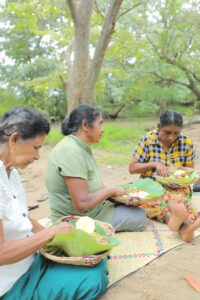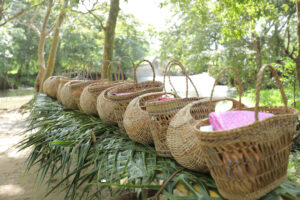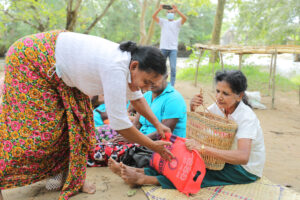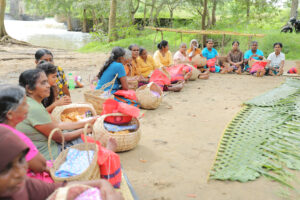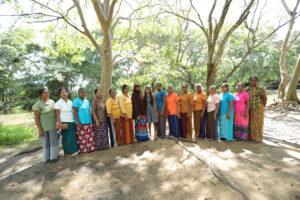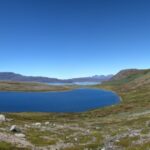Introduction
The purpose of this workshop is to create an intergeneration dialogue about cultural memories and climate stories. The goal of this workshop is to utilize cultural memories in policy decision platforms as a climate solution and to ensure the sustainability of the village societies. Intangible cultural heritage is increasingly recognized as a valuable among heritage practitioners. Our ancestors thoughtfully preserved their knowledge systems in oral traditions and entrusted their knowledge, practices, experience, values, and attitudes to the next generation. The elderly community who carries the cultural memories plays a significant role in village socio-economic functions—they are the living heritage of the country. However, the cultural memories of these communities have been neglected in most heritage studies. This aging community has become increasingly vulnerable community to climate change. They have witnessed climate change in the recent past and they possess historical memories passed down from generation to generation as an oral tradition. These oral traditions are not written in history and these data project the social dynamics and the story of nature and culture beyond the elites who often control material heritage and collective memories of the past.
The potential break in oral transmission endangers such knowledge traditions, requiring conservation and recording to safeguard their survival. This workshop attempts to record the knowledge systems embedded in these cultural memories before they are buried with their heritage bearers. The study will be the first of its kind undertaken in Sri Lanka; as an initial workshop that unveils a subordinated area in the world heritage in general and global south heritage studies. Therefore, this research takes a deep plunge into the heritage of the community of Sri Lanka to elicit knowledge to achieve the objective and outcomes in line with eco-friendly and sustainable concepts.
Workshop Location
The workshop was held at Thalpotha Village Polonnaruwa district, North Central Province, Sri Lanka on the riverside of Hathamuna Oya, a small tributary of River Mahaveli. Several factors were considered in selecting this venue for the workshop. First, A. D. N. Fernando published the changes of the Mahaweli River in this area. In his mapping project on the Mahaweli River (the longest river in Sri Lanka), Fernando discovered the ancient course of the Mahaweli River, using Arial Photographs. Second, most of the archaeological sites in the region are located along the old course. Ancient historical textual sources also testify to the distribution of historical places there. Third, cultural diversity and community members including resettled people under the agricultural colonize scheme.
This recollection attempted to identify the memories of the old river course, reasons for the river changes, and the impact of river change on the socio-economic life in the area. The workshop location was located next to the Somawathi national forest reserve and Flood plain national park—an area that gets flooded annually. The lived experiences of natural hazards were also identified. The main livelihood of the villagers is agriculture, while they engage in many nature-based alternative livelihood activities to increase their income including livestock and craft activities.
Sample size and composition
Sixteen women participated in the workshop. The women are from the surrounding villages of Thalpotha, Sungavila, and Patunugama. They represent a group of people between the ages of 10 and 90, and are representative of the ethnic diversity in the area. The reason for selecting different age groups is primarily aimed at creating an intergenerational dialogue. There was ascertained local ecological knowledge, traditional weather-related information. They recollected their cultural memories in the form of folk songs, stories, folk dancing and music, and family histories. The cultural memories that came out during the workshop were absorbed by the other participants too.
The entire workshop was conducted in an eco-friendly manner. The workshop was held in an open-air space on the riverside of the Hathamuna Oya. The participants dressed in traditional attire and these women were greeted with a betel leaf herring, the Sri Lankan traditional respectful way of invitation, and welcome. Then, they were seated on the beautiful reed mats woven by a woman from the same area. She procures reads from the local marshlands and tank cascade systems.
Workshop Findings
Women vividly described their memories and shared both of their grievances and proud memories. They remembered the experience and stories of their great grandparents too. Traditionally, the womenfolk have been spent their day in the kitchen and in the farmland. The workshop was an opportunity for them to first of its kind to think beyond their miserable workload and to bring a smile to their faces on the very first day of the new year. All the participants have given their verbal and written consent to attend the workshop and followed the Covid 19 health guidelines under the permission of the local authority, regional secretariat, and the Public Health Inspector.
Sri Lankan traditional village culinary traditions were brought to the workshop in many ways. The buffet was arranged on a wooden platform covered by woven coconut twigs. All dishes were served in clay pots obtained from a local potter. Participants were given locally available plant-based eco plates and cups to have their breakfast, tea, and lunch. They are banana leaves, lotus leaves on small reads baskets (Pan watti) as plates, and coconut shells as cups. Traditional milk rice (kiribath) and some traditional snacks, and fruits were offered as the breakfast. Sri Lankan sweet meat Halapa made out of whole-grain finger millet (Kurakkan) comes in eco-wrapping and served with herbal tea (Belimal) and local jaggery (Hakuru) during the tea. The traditional lunch menu consisted of entirely organic food cooked by a local woman using natural Sri Lankan species. It was a nutritious meal that reminds our past healthy food habits and lifestyle. Most of the vegetables and fish were obtained from the tank cascade system. At the end of the program, a gift pack of essential dry food (wrapped and packaged without using plastic) was given to the participants. They were arranged in cane baskets woven by a woman in this area. She uses locally available eco-friendly raw materials and runs a small-scale craft shop.
Before the workshop, the background information on Climate changes, natural hazards, and geophysical changes in the area was explored to understand the contextual background. The researcher attended the workshop remotely via zoom technology. In the beginning, the researcher made an inspirational speech on Sri Lankan heritage and make them proud and aware of their heritage. Then conducted semi-structured interviews and allowed the participants to recall their memories freely. The data were qualitatively analyzed and synthesized. Climate change adaptation-related information and local ecological knowledge were identified from their cultural memories as followed.
- Weather patterns, monsoon rains, rainwater harvesting
- Extreme weather events and natural disasters (floods, drought), increasingly unpredictable weather patterns, and warming up
- Community-based agriculture, nature-based solution, and division of labor
- Village level social and agricultural organizations and water management mechanism during the drought.
- Traditional agriculture uses, water sparingly during droughts, and traditional water management and governance structures that strengthened the continued food supply
- Climate migration and climate displacements, temporary camps in temples in the area, and resilience.
- Access to natural resources and water resources in the area
- Food conservation and preservation and disaster preparedness for the annual flooding
- Pilgrims to Somawati Stupa (most significant religious attraction in the area) by bullock carts and traditional Canoes to cross the river
- Rituals to God Minneri in order to obtain rains during the droughts and stoop the flood, getting blessings before and after the harvest, rituals to Goddess Pattini to prevent epidemics,
- Migration from the intermediate zone (central highlands) and settlements in the dry zone under new agricultural colonization projects.
- Adaptative capacity demonstrates by adapting to a new environment with various climatic and topographical conditions set in an entirely different climate zone, family practices, weather patterns far from their heritage roots
Key changes and risks were identified:
- During the Civil War that lasted for about three decades in Sri Lanka, the area was identified as a border village and some villages lost their lives
- Due to its location near a forest reserve, it is constantly threatened by wild elephants.
- Due to the abandonment of traditional farming methods and embracing the usage of modern chemical fertilizers, pesticides, and weedicides the villages are suffering from kidney disease (three participants were widows and their husbands died due to kidney disease.
- There is a huge vacuum in the traditional knowledge and interpreting the knowledge
First, the workshop helps to understand how cultural memories can be utilized as valuable data in studying climate change in Sri Lanka. Secondly, the dialogue explores the application of experienced-based memories to identify the adaptative capacity and strategies. Finally, this recollection investigated, documented, and revitalized Sri Lankan cultural heritage in a time of rapid social pressure from transformations towards modernization and a global pandemic.
Moving forward
The generation of a research reference collection/e-learning materials articulating and unveiled findings from the cultural memories that can create an intellectual platform to brainstorm potential use of the heritage practices for a sustainable future. This is knowledge dissemination that will undoubtedly help future researchers who are not competent in reading and interpreting this indigenous knowledge. On the other hand, this attempt will be bridging the gaps of traditional heritage subordination in the world and South Asia in particular.
Reference:
Fernando, A. Denis, N. (1980) Major Ancient Irrigation works of Ceylon, Journal of the Sri Lanka Branch of the Royal Asiatic Society, 22, 1–24. http://www.jstor.org/stable/45277707
Fernando, A. Denis, N. (1965) “Old course of Mahaveli Ganga” Survey department, New Letter No 38


